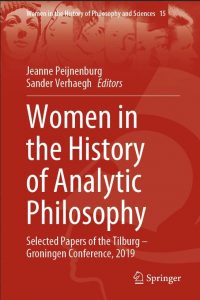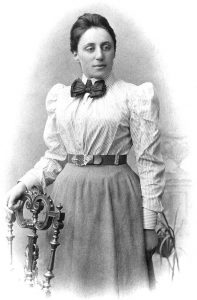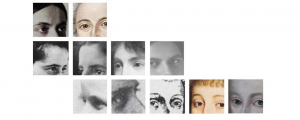Women in the History of Analytic Philosophy - Springer

 The book Women in the History of Analytic Philosophy (2022), edited by Jeanne Peijnenburg and Sander Verhaegh, is part of the Springer series Women in the History of Philosophy and Sciences and presents a collection of papers from the workshop held in October 2019 in Tilburg, Netherlands, dedicated to highlighting the contributions of female philosophers to the development of early analytic philosophy. In the following, we present „Emmy Noether’s Influence on Contemporary Philosophy of Mathematics“ by Dilek Kadioglu:
The book Women in the History of Analytic Philosophy (2022), edited by Jeanne Peijnenburg and Sander Verhaegh, is part of the Springer series Women in the History of Philosophy and Sciences and presents a collection of papers from the workshop held in October 2019 in Tilburg, Netherlands, dedicated to highlighting the contributions of female philosophers to the development of early analytic philosophy. In the following, we present „Emmy Noether’s Influence on Contemporary Philosophy of Mathematics“ by Dilek Kadioglu:
This article argues that the work of Emmy Noether (1882–1935) has influenced the development of category theory and thereby paved the way for contemporary debates in the philosophy of mathematics. In the second half of the twentieth century, category theory was presented as a rival to set theory concerning the foundations of mathematics and also as a framework that can account for mathematical practice in general. Noether’s contributions to algebra present an approach to mathematical questions that differs from previous works in its level of abstractness, and a new way of doing mathematics that constitutes a precursor of category theory. Moreover, Noether’s work stands out in its tremendous influence on the work of other mathematicians which is another fact that contributed to the discovery of category theory. In this sense, Noether’s work is very important for contemporary philosophical discussions about the foundations and nature of mathematics.
 Interested? If you would like to learn more about women mathematicians and their philosophical contributions, feel free to explore our Directory of Women Philosophers. The Directory provides a comprehensive overview of women philosophers and scientists from approximately 2300 BCE to the 21st century. It currently includes over 240 names, continuously updated with biographical information, primary and secondary sources, as well as relevant quotes and key concepts. In this ever-expanding collection, you will find mathematicians such as Sophie Germain, Maria Gaetana Agnesi, Laura Bassi and many more.
Interested? If you would like to learn more about women mathematicians and their philosophical contributions, feel free to explore our Directory of Women Philosophers. The Directory provides a comprehensive overview of women philosophers and scientists from approximately 2300 BCE to the 21st century. It currently includes over 240 names, continuously updated with biographical information, primary and secondary sources, as well as relevant quotes and key concepts. In this ever-expanding collection, you will find mathematicians such as Sophie Germain, Maria Gaetana Agnesi, Laura Bassi and many more.
You cannot copy content of this page








